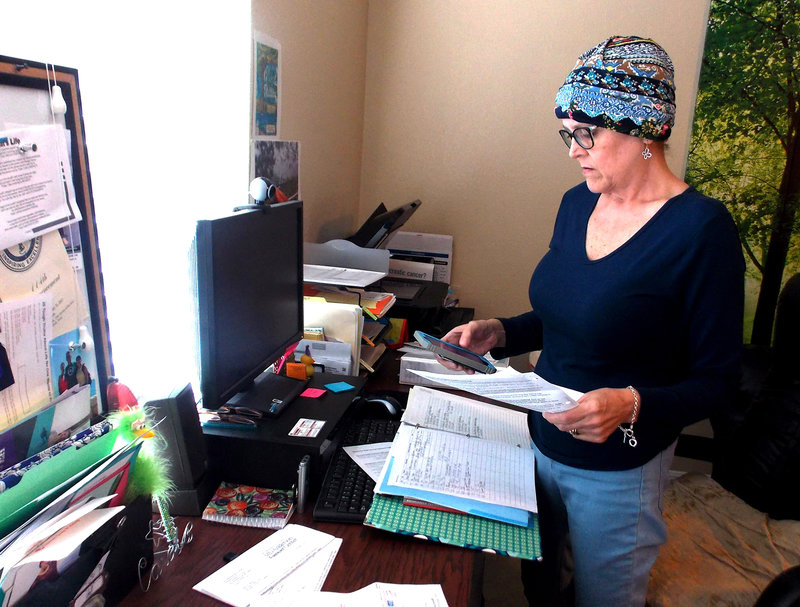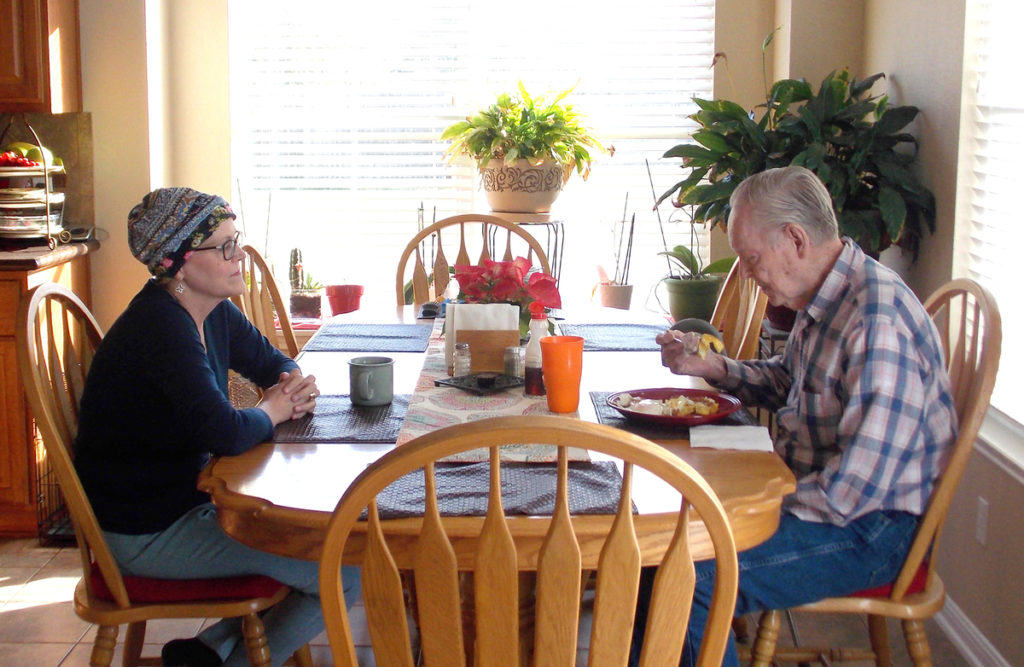
Cancer Complications: Confusing Bills, Maddening Errors And Endless Phone Calls
PHOTO: Carol Marley, a hospital nurse with private insurance, says coping with the financial fallout of her pancreatic cancer has been exhausting. CREDIT: Anna Gorman/KHN
LISTEN
BY ANNA GORMAN / KAISER HEALTH NEWS
Carol Marley wants everyone to know what a life-threatening cancer diagnosis looks like in America today.
Yes, it’s the chemotherapy that leaves you weak and unable to walk across the room. Yes, it’s the litany of tests and treatments – the CT scans and MRIs and biopsies and endoscopies and surgeries and blood draws and radiation and doctor visits. Yes, it’s envisioning your funeral, which torments you day and night.
But none of these is her most gnawing, ever present concern.
That would be the convoluted medical bills that fill multiple binders, depleted savings accounts that destroy early retirement plans and so, so many phone calls with insurers and medical providers.
“I have faith in God that my cancer is not going to kill me,” says Marley, who lives in Round Rock, Texas. “I have a harder time believing that this is gonna get straightened out and isn’t gonna harm us financially. That’s the leap of faith that I’m struggling with.”
Coping with the financial fallout of cancer is exhausting — and nerve-wracking. But the worst part, Marley says, is that it’s unexpected.
When she was diagnosed with adenocarcinoma of the pancreas head in July, she didn’t anticipate so many bills, or so many billing mistakes. After all, she is a hospital nurse with good private insurance that has allowed her access to high-quality doctors and hospitals.
Randall Marley, a computer systems engineer, says he frequently comes home from work to find his wife feeling unwell and frustrated about having spent a precious day of her recovery making phone calls to understand and dispute medical bills. One recent night she was in tears and “emotionally at a breaking point,” he says. “The hardest part of this is seeing the toll it’s taken on my wife.”
Stress-Inducing Bills Accumulate
More than 42 percent of the 9.5 million people diagnosed with cancer from 2000 to 2012 drained their life’s assets within two years, according to a study published last year in the American Journal of Medicine. Cancer patients are 2.65 times more likely to file for bankruptcy than those without cancer, and bankruptcy puts them at a higher risk for early death, according to research.
But those statistics don’t convey the daily misery of a patient with a life-threatening disease trying to navigate the convoluted financial demands of the U.S. health care system while simultaneously facing a roller coaster of treatment and healing.
Stephanie Wheeler, a professor at the University of North Carolina at Chapel Hill, said the number of bills coming from different providers can be overwhelming.
“It’s oftentimes multiple different bills that are rolling in over a period of several months and sometimes years,” says Wheeler, who has conducted survey research with metastatic cancer patients. “As those bills start to accumulate, it can be very stress inducing.”
Given that many patients can’t work during treatment, these bills may force even relatively well-to-do cancer patients to take out second mortgages, spend college savings or worry about leaving debt behind for their families, Wheeler says.
Carol Marley is a slight woman who dotes on her two dogs and is involved in her church. Her 88-year-old father, who has dementia, had moved in a few years earlier. She and her husband, Randall, pride themselves on living frugally. They pay their credit card off every month and don’t have car payments.

After Carol Marley was diagnosed with pancreatic cancer last July, she worried what it would mean for her family, including her 88-year-old father with dementia. CREDIT: Anna Gorman/KHN
Carol and her daughter, June Marley, who is a second-year college student, have health insurance through Carol’s employer, Ascension Health, a large faith-based health care system with facilities across the nation. Carol’s husband has separate insurance through his job.
They were hoping to retire early, buy an RV and drive around the country. Instead, they see their meticulous plans disappearing, even if Carol recovers.
Their high-deductible insurance policy meant they had to spend $6,000 before their insurance started covering her treatment expenses. They hit their annual out-of-pocket maximum of $10,000 well before the year was over.
But Carol says she was prepared for that. “What I didn’t anticipate is the knock-down, drag-out fight that I would have to engage in to get people to see there were errors and address it.”
Since she’s unable to work, the family lost her nursing salary.
“Money is not coming in, and it’s going out by the thousands,” she says.
From Nurse To Patient
Carol had treated cancer patients before. She had seen them come in with unexplained aches and leave with devastating diagnoses. Now it was her turn.
Though she didn’t recognize it at the time, her symptoms were textbook. Fatigue. Back pain. Weight loss. In July, doctors told her she had pancreatic cancer.
Her first thought was that she was going to die. One nurse friend asked if she had her affairs in order. That’s because pancreatic cancer is usually discovered too late. Just 9 percent of patients are alive five years after diagnosis, compared with 90 percent of breast cancer patients.
Carol knew she was lucky. Hers hadn’t spread. She might be able to undergo surgery. But first, four months of chemotherapy and five weeks of radiation.
The chemotherapy — seven or eight rounds, she can’t quite remember — drained her. “I couldn’t put words together in my head,” she says. She had muscle spasms and developed fevers that landed her in the emergency room.
As she became weaker, Carol realized she could no longer care for her father at home. On a recent morning in early January, she sat down with a nurse from a memory-care facility where a space had become available. Holding back tears, Carol told the nurse she knew this day would come. “I didn’t think it would be so soon, and I didn’t know under these circumstances.”
Different Insurers Leads To Different Bills
Later that same day, Carol’s energy was up. She adjusted the colorful scarf on her head, turned on her computer and pulled out a pen. Some days she spends hours trying to clarify and fix medical bills. “But I don’t do that frequently because it is so fruitless and it is stressful,” she said.
Often, she is just trying to figure out what different bills mean. “Even as a nurse, I feel like it’s impossible to understand,” she said. “I can’t make heads or tails of it.”
Sometimes there are errors.
Part of the problem, she contends, is that one insurance company covers visits with Ascension providers and hospitals and another company covers pharmacy claims, specialty drugs and providers outside Ascension’s network. Some of the bills, including a $1,400 one from an ER visit — were sent to the wrong insurer, she says.
Carol cites other issues. An $18,400 chemotherapy bill was submitted with missing information and then denied because it arrived late. An $870 MRI bill was denied because the provider said there was no pre-authorization.
“It’s not any one individual. It’s not any one system or provider,” she says. “The whole system is messed up. … There’s no recourse for me except to just keep making phone calls.”
On this particular afternoon, Carol has a long list of calls to make. One to figure out why she couldn’t access her insurance claims online. Another to a medical provider that urged her to pay $380, even though it acknowledged that it owed her about $80 of that total.
Someone who answers the phone suggests again that Carol pay the entire amount. “Once it’s posted to your account and it goes through, we would send you a check,” the woman says.
Carol shakes her head. “I’m sure y’all are fine people over there, but I’m not trusting a refund to come,” she responds, reflecting on her experience as a consumer of cancer care. “The problem is, they want their money and they are going to get it one way or the other.”
As for her hospital bills, Ascension declined to comment, citing protected health information. But spokesman Nick Ragone said, “The matter at issue was favorably resolved.”
He didn’t say which issue was resolved.
Kaiser Health News is a nonprofit news service covering health issues. It is an editorially independent program of the Kaiser Family Foundation and is not affiliated with Kaiser Permanente.















